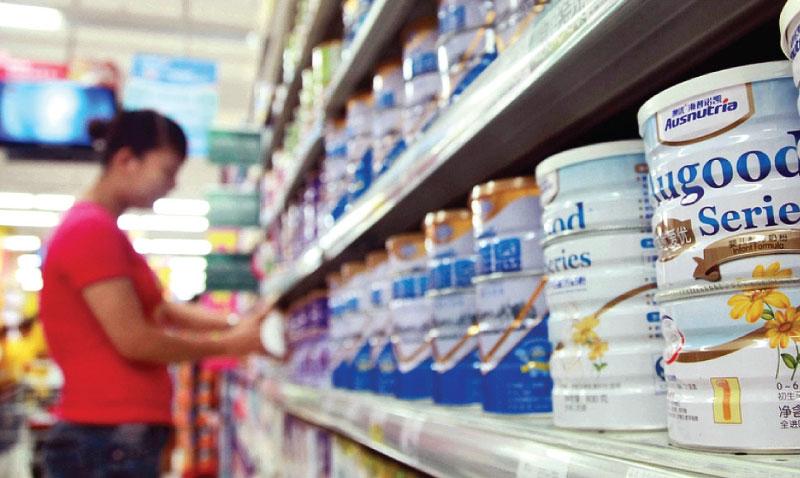
A new international investigation has revealed a shocking lack of science behind the infant formula ranges sold by baby milk companies – and some questionable marketing practices as well.
Exclusive breastfeeding for the first six months of life – a practice recommended by every health organisation in the world – provides a baby with everything it needs to grow and thrive. Not just nutrition, but hundreds of non-nutrient factors which cannot be synthesised in the lab and which help protect against illness and promote optimal growth.
Nutritional science
For those women who don’t or can’t breastfeed, being able to trust that infant formula is providing the best possible nutrition is very important.
But a new report, Milking It, from the non-profit, UK-based Changing Markets Foundation notes that while there is a single global standard for what ingredients should be in infant formula, the top four manufacturers, Nestlé, Danone, Mead Johnson Nutrition (recently acquired by Reckitt Benckiser), and Abbott sell a mind-boggling number - more than 400 individual products - between them globally.
Too often, according to the report, manufacturers add unnecessary ingredients with no proven benefits – so that they can charge a premium price for their products. This isn’t illegal but it is unethical and in breach of a voluntary World Health Organization (WHO) code on the marketing of breastmilk substitutes.
Added fats, pre- and pro-biotics and certain nutrients, may make more plausable manufacturers’ claims to make formula which is closer to breastmilk, represents the latest developments in nutritional science, or satisfies hungrier babies, to promote better digestion, or to aid sleep.
But, says the report: “There is little nutritional science and few beneficial health considerations behind their extensive product ranges.”
Paying a premium
These premium products do not cater to mothers’ or babies’ needs but instead exist to create a market that capitalises on mother’s anxiety around feeding their children, and their willingness to pay a premium for what they think is scientific certainty.
In analysing the retail prices that companies around the world charge for infant formula, the report found that manufacturers charge whatever they can get away in individual markets – a fact underscored by the wildly different prices that the same brands sell for in different parts of the world.
The most expensive products, for instance, were found in China and Hong Kong, where families can spend US$286 and US $304 per month to feed a 2-3-month old baby, respectively, based on using the most expensive product in those markets.
In 2008 infant formula made in China was found to be contaminated with toxic melamine, deliberately added to some formulas to make them appear as if they contained more protein than they did. Many infants were made ill and some died from drinking the adulterated formula.
Today Chinese mothers still seek big Western brands believing that they are better, or purer, than Chinese brands. The big brands capitalise on this fear by charging exorbitant prices for their products.
As a result, parents in China can spend up to 40% of their average salary on infant formula. In comparison, the most expensive formula in European countries will only cost 1-3% of an average salary.
Trusted friends?
The report also highlighted the extent to which formula companies listen in on mothers’ social media posts in order to learn about their hopes, fears and desires – and then tailor their marketing outreach around that. Manufacturers use internet platforms such as Facebook, as well as online mother and baby clubs (often financed by formula manufacturers themselves), to collect vital information on mothers, and to portray themselves as trusted ‘friends’ on the ‘mother’s journey’ in order to sell their products.
“Our report found that instead of nutritional science, companies are basing their selling strategies on market research and consumer preferences,” said Nusa Urbancic from Changing Markets Foundation.
“Product differentials are carefully and deliberately designed to appeal to the tastes and lifestyle preferences of parents, or their natural desire to give their babies the best possible start in life. As such, manufacturers can package these products in ‘premium’ ranges and charge high prices accordingly.” Better regulation and legislation required The report calls for a comprehensive overhaul of global infant milk products and the introduction of stricter regulation, so that only those products based on unequivocal scientific advice, and with the highest quality of nutritional ingredients, are sold.
It also calls on governments to introduce and enforce national legislation that fully implements the WHO marketing Code and to ensure that the safety and nutritional quality and completeness of products are regularly verified.
To coincide with the report Sum of Us, the global online campaigning platform, launched a petition on November 1 calling for Nestlé to make sure their infant milks are safe, nutritionally complete and based on science. It gained nearly 60,000 signature son its first day.
– Third World Network Features.
